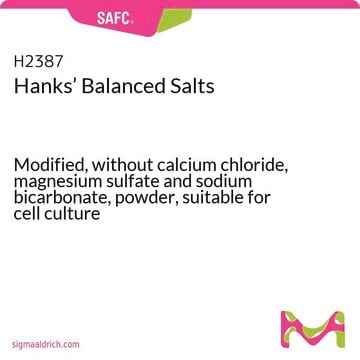H1387
Hanks′ Balanced Salts
Modified, without phenol red and sodium bicarbonate, powder, suitable for cell culture
Synonyme(s) :
HBSS
About This Item
Produits recommandés
Niveau de qualité
Forme
powder
Technique(s)
cell culture | mammalian: suitable
Température de stockage
2-8°C
Vous recherchez des produits similaires ? Visite Guide de comparaison des produits
Description générale
Application
- for diluting digested tissues during isolation of pancreatic blood vessels
- for washing mouse intestinal mucosal cells before lysis and sonication
- as an immersion solution to test the in vitro bioactivity of poly(ε-caprolactone)-coated hydroxyapatite scaffold derived from cuttlefish bone
Quantité
Reconstitution
Autres remarques
Code de la classe de stockage
11 - Combustible Solids
Classe de danger pour l'eau (WGK)
WGK 3
Point d'éclair (°F)
Not applicable
Point d'éclair (°C)
Not applicable
Équipement de protection individuelle
Eyeshields, Gloves, type N95 (US)
Certificats d'analyse (COA)
Recherchez un Certificats d'analyse (COA) en saisissant le numéro de lot du produit. Les numéros de lot figurent sur l'étiquette du produit après les mots "Lot" ou "Batch".
Déjà en possession de ce produit ?
Retrouvez la documentation relative aux produits que vous avez récemment achetés dans la Bibliothèque de documents.
Les clients ont également consulté
Notre équipe de scientifiques dispose d'une expérience dans tous les secteurs de la recherche, notamment en sciences de la vie, science des matériaux, synthèse chimique, chromatographie, analyse et dans de nombreux autres domaines..
Contacter notre Service technique






